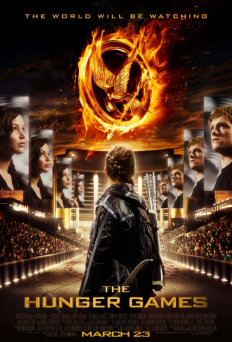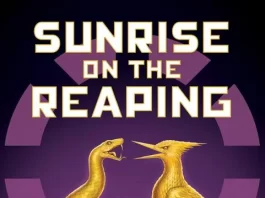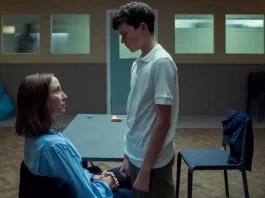Print Edition: March 28, 2012
 The audience seems a little too impressed by some pretty standard lines, falls completely in love with nervous banter, is enchanted by fire as if they’ve recently moved in from Pleasantville, and is taken aback by what must be rote by the seventy-fourth edition of this type of event. This is The Hunger Games, but more specifically this is the movie adaptation of the story, which thrusts the audience identification, directorial manipulation, and artificiality of the would-be Olympian entertainment into sharp relief.
The audience seems a little too impressed by some pretty standard lines, falls completely in love with nervous banter, is enchanted by fire as if they’ve recently moved in from Pleasantville, and is taken aback by what must be rote by the seventy-fourth edition of this type of event. This is The Hunger Games, but more specifically this is the movie adaptation of the story, which thrusts the audience identification, directorial manipulation, and artificiality of the would-be Olympian entertainment into sharp relief.
The Hunger Games is ultimately the story of how the reluctant hero Katniss, and her opponents in the game, will do anything once seduced by the camera, and how an audience will eat this up, each locked in gaze with the other, never looking at the larger problem of how the overarching system keeps them in. Maybe it’s because it’s been there so long, presided over so many games, done so much harm and provided some measure of entertainment along the way – but that they don’t dare to question it is the unspoken problem of the movie, both on a narrative and aesthetic level. Director Gary Ross implants his adaptation with a sense of protraction, disaffected line readings, and mannered circumstance, barely referencing, let alone investigating, the morbidity hanging over the event that takes place in the second half of the movie.
The handheld camera that haphazardly locates Jennifer Lawrence (Katniss) is less the artistic decision of so-called subjective cinema and more an act of conformism to the modern rule of action filmmaking to hide unimpressive effects and unimaginative action. The whip pans occasionally find some obscured beauty in the green-spliced surroundings that shield and ensnare the combatants, but more often it’s a hindrance, which along with the tired presentation of hallucinations and dangerous walks in the dark, indicates wherever Ross found the imagination that anchored Pleasantville, it’s now long lost.
This flaw of the narrow focus, embedded in the camera, is also reflected in the narrative. The screens watched by the frozen townspeople and gilded aristocrats display so many points of action they are divided into three, yet this adaptation both strays from a completely singular perspective (we frequently see things Katniss cannot, or see her from a different view than her own) and completely sidesteps detailing those other points of view. For despite The Hunger Games’ mentality of resolute indignation at the idea that the working class of the world should have to dance for the heartless upper crust’s fun, the other 23 combatants are excluded. If they have families watching in quiet horror at home, if they have thoughts, lives, dreams as we are drilled that Katniss does, we never hear about it. One idea The Hunger Games submits as worthy is that to marginalize, to count out someone, is a great error, yet consider the scene where those who have died in the early stages of the games flash above in the digital sky as an announcement to the few left. They count as numbers towards Katniss’ goal, but the deceased mean absolutely nothing to this movie – they are fodder, just as the loathsome directors of the game view them. This carries through to the few people Katniss meets, who are about as useful as the sponsored help items, and just as disposable. So devoid of lives—so utterly worthless except as objects to aid our hero they are—that one dies telling Katniss “you have to win.”
The Hunger Games isn’t to be commended or derided for treating its subjects in such a way on the grounds of being a cynical movie, because it fundamentally isn’t. The outcome bears that out. It’s more a case of a movie that cloaks itself in cynicism to excuse what proves to be shallow work, characters and ideas. Its main character is treated as more deserving of empathy, identification and worship, when there are so many different paths, emotions and motivations that could be—but aren’t—at play here. Instead, small moments of moral superiority are celebrated, never mind that they are they’re still all under the same system.
Revolution is a word that seems like it might be on the tip of everyone’s tongues in the world of Pan-Em, both in the game and in the dilapidated grey homes, yet aside from one throwaway scene it’s never expanded on. For this movie, living, dying, it doesn’t matter. The Hunger Games sets out—and proves—a reality where we only want to be entertained by set pieces called down by digital dictators, just so long as the side we’re rooting for wins.




